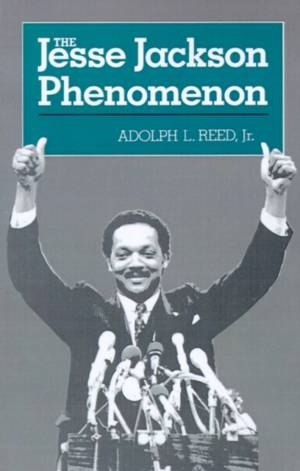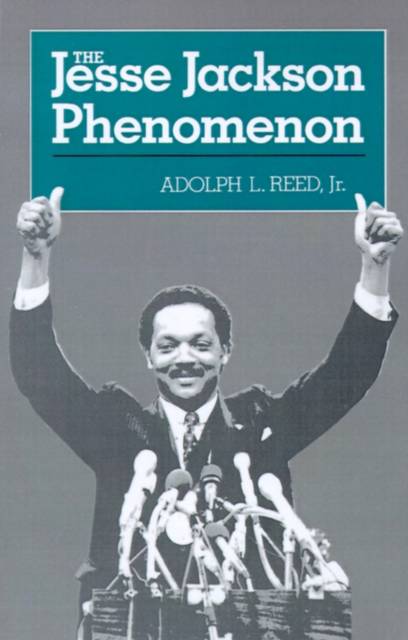
En raison d'une grêve chez bpost, votre commande pourrait être retardée. Vous avez besoin d’un livre rapidement ? Nos magasins vous accueillent à bras ouverts !
- Retrait gratuit dans votre magasin Club
- 7.000.000 titres dans notre catalogue
- Payer en toute sécurité
- Toujours un magasin près de chez vous
En raison de la grêve chez bpost, votre commande pourrait être retardée. Vous avez besoin d’un livre rapidement ? Nos magasins vous accueillent à bras ouverts !
- Retrait gratuit dans votre magasin Club
- 7.000.0000 titres dans notre catalogue
- Payer en toute sécurité
- Toujours un magasin près de chez vous
45,95 €
+ 91 points
Description
How did Jesse Jackson - who had never run in an election and had only recently registered to vote - become the black candidate for the 1984 Democratic presidential nomination? What does his campaign show about the dynamics that drive Afro-American political activity? In the first book to analyze the Jackson campaign, a black scholar who has worked extensively with local black political organizations argues that the Jackson Candidacy revealed tensions within Afro-American politics and hurt rather than helped the development of a viable black political movement.
Reed demonstrates that issues such as the competition for top leadership roles among Afro-Americans, the deepening income and class stratification within the black community, and the disintegration of the Democratic coalition that has in the past supported black aspirations are all problems facing Afro-American politics today. He studies these areas of contention in several ways. First, he explores the rift between black elected politicians and black politicians who, like Jackson, come from the "protest politics" of the 1960s. Since the black church is the source for many of the protest politicians, Reed critically reconstructs the role of the church in black politics and suggests that, contrary to prevailing views, the church in general has not been associated with emancipatory or progressive interests in the black community.
Reed then discusses the relationship between Afro-Americans and the other constituents of the Democratic coalition, particularly the labor movement and organized Jewry, and he comments insightfully on the controversies that attended the Jackson campaign's relationship with each of those groups. He also examines reactions of the mass media and the left to Jackson's campaign, discovering both to be reluctant to apply the same standards to black political activity that are used to evaluate white political efforts.
Reed concludes by proposing strategies for black political action: these include constructing a political counteroffensive to the retrenchment associated with Reaganism and cultivating a more creative discourse about politics within the black community.
Reed demonstrates that issues such as the competition for top leadership roles among Afro-Americans, the deepening income and class stratification within the black community, and the disintegration of the Democratic coalition that has in the past supported black aspirations are all problems facing Afro-American politics today. He studies these areas of contention in several ways. First, he explores the rift between black elected politicians and black politicians who, like Jackson, come from the "protest politics" of the 1960s. Since the black church is the source for many of the protest politicians, Reed critically reconstructs the role of the church in black politics and suggests that, contrary to prevailing views, the church in general has not been associated with emancipatory or progressive interests in the black community.
Reed then discusses the relationship between Afro-Americans and the other constituents of the Democratic coalition, particularly the labor movement and organized Jewry, and he comments insightfully on the controversies that attended the Jackson campaign's relationship with each of those groups. He also examines reactions of the mass media and the left to Jackson's campaign, discovering both to be reluctant to apply the same standards to black political activity that are used to evaluate white political efforts.
Reed concludes by proposing strategies for black political action: these include constructing a political counteroffensive to the retrenchment associated with Reaganism and cultivating a more creative discourse about politics within the black community.
Spécifications
Parties prenantes
- Auteur(s) :
- Editeur:
Contenu
- Nombre de pages :
- 138
- Langue:
- Anglais
- Collection :
Caractéristiques
- EAN:
- 9780300035520
- Date de parution :
- 01-05-86
- Format:
- Livre broché
- Format numérique:
- Trade paperback (VS)
- Dimensions :
- 152 mm x 219 mm
- Poids :
- 267 g

Les avis
Nous publions uniquement les avis qui respectent les conditions requises. Consultez nos conditions pour les avis.






